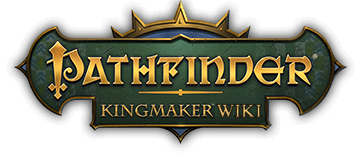Pathfinder: Kingmaker is based on the Pen and Paper tabletop game Pathfinder and retains much of the same mechanics, though in computerized form.
Camping[ | ]
See Camping.
Condition[ | ]
See Condition.
Dice[ | ]
In the tabletop version, whenever there is a challenge or question of whether or not something will succeed, the players role dice to simulate randomness. These dice rolls are then modified by the strengths and weaknesses of both the characters that are being played, but their equipment, and the situations they are in.
Dice are the basis for any situation that may be influenced by random chance, and they come in a variety of forms. Them most common forms are 3, 6, 8, 10, 12 and 20-sided dice. When a mechanic specifies what dice be rolled, the way it's listed is #d#, for example 3d6. The first number is how many dice are rolled and the second is the number of sides on those dice. In our previous example, it would be three dice of the six-sided variety. Lastly, there may a be +# or -# on the end, which is simply a number that is added or subtracted from the total of the dice added together. For example, 2d8+4 would mean to roll two dice, each with eight sides, add the dice values together, and then add another 4 points.
One of the more common uses of dice rolls is to see if a character is skilled enough to do something. For example, a thief might want to pick a lock on a chest, so their player would roll a 20-sided dice (the standard dice for skill rolls), add their skill modifier from the Trickery skill (which will range from 0, completely untrained, to 20, which is world-class master), and any modifiers, such as a -2 penalty from being in a hurry, or a +2 bonus because they have the blueprints for the lock.
Despite the fact that this is a computer game, and no actual dice are being rolled, in many places in both the game and the wiki the notation is still used. While the damage for a shortsword could, and sometimes is, simply be listed as 1-6, for many veterans of tabletop gaming, they are more comfortable seeing it as 1d6.
Difficulty Class[ | ]
Having a system for determining skill and randomness is important, but is useless without a way of determining how difficult a task is. This is where Difficulty Class, often abbreviated as "DC" comes in. DC is the number that a roll needs to match or beat to be considered a success. An example for a skill roll like the previously mentioned attempt to pick a lock, might be a DC of 10, which is considered an easy roll, because even without any skill, a 20-sided dice will succeed more than 50% of the time.
It is important to note that many common rolls are considered automatic successes if the maximum number is rolled and automatic failures if the minimum number is rolled. For example, on a 20-sided dice, one of the most commonly rolled dice, a 20 is success, regardless of all other factors, and 1 is a failure, no matter what. See the individual mechanics for more details.
Dice are extensively used in both combat and with skills, and have articles that will detail both.
Encumbrance[ | ]
See Encumbrance.
Experience Points[ | ]
See Experience Points.
Hit Points[ | ]
See Hit Points.
